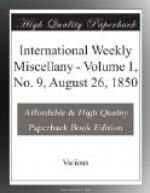Edward retired to his room to change his dress, and to write some letters, he said, but more particularly to avoid Emily, in order not to excite her husband’s jealousy. As the bell rang for dinner he saw her again, and found to his surprise that the captain, whom he had first seen in the coffee-room, and who had given him so much information, was one of the party. He was much pleased, for they had taken a mutual fancy to each other. The captain was not at quarters the day Edward had left them, but as soon as he heard where his friend had gone, he put horses to his carriage and followed him, for he said he also should like to see these famous estates. D’Effernay seemed in high good humor to-day, Emily far more silent than yesterday, and taking little part in the conversation of the men, which turned on political economy. After coffee she found an opportunity to give Edward (unobserved) a little packet. The look with which she did so, told plainly what it contained, and the young man hurried to his room as soon as he fancied he could do so without remark or comment. The continued rain precluded all idea of leaving the house any more that day. He unfolded the packet; there were a couple of sheets, written closely in a woman’s fair hand, and something wrapped carefully in a paper, which he knew to be the ring. It was the fellow to that which he had given the day before to Emily, only Ferdinand’s name was engraved inside instead of hers. Such were the contents of the papers:—
“Secrecy would be misplaced with the friend of the dead. Therefore, will I speak to you of things which I have never uttered to a human being until now. Jules D’Effernay is nearly related to me. We knew each other in the Netherlands, where our estates joined. The boy loved me already with a love that amounted to passion; this love was my father’s greatest joy, for there was an old and crying injustice which the ancestors of D’Effernay had suffered from ours, that could alone, he thought, be made up by the marriage of the only children of the two branches. So we were destined for each other almost from our cradles; and I was content it should be so, for Jules’s handsome face and decided preference for me were agreeable to me, although I felt no great affection for him. We were separated: Jules traveled in France, England, and America, and made money as a merchant, which profession he had taken up suddenly. My father, who had a place under government, left his country in consequence of political troubles, and came into this part of the world where some distant relations of my mother’s lived. He liked the neighborhood; he bought land; we lived very happily; I was quite contented in Jules’s absence; I had no yearning of the heart toward him, yet I thought kindly of him, and troubled myself little about my future. Then—then I learned to know your friend. Oh, then! I felt, when I looked upon him, when I listened to him, when we conversed together, I felt, I acknowledged that there




